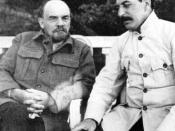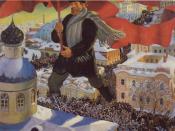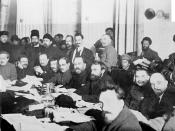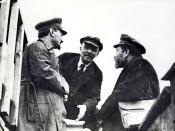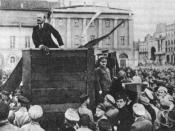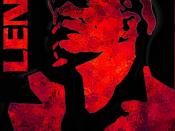Following his death in 1924 Lenin was raised to the status of a god-like figure by Stalin. Lenin's role in the November revolution was therefore seen as crucial. However, was this merely to allow Stalin to gain power by presenting himself as a faithful successor to Lenin? The varying schools of historical interpretation give differing views as to how crucial Lenin's role was in the revolution.
Although Lenin spent the majority of 1917 in exile, this did not stop him playing a leading role in the party. Lenin's first step after his return from Switzerland was to issue his April Theses, which as well as outlining Bolshevik policies, also illustrates Lenin's personal determination to make the revolution happen. Although not immediately accepted by the party it did later win them support because they were the only party who did not support the Provisional Government.
Lenin's other crucial step towards the revolution is a letter he sent to the Central Committee (12-14 Sept) calling for a second revolution.
Lenin recognised that the time was right for a revolution and had to persuade the party to act straight away before the favourable moment passed. Lenin was worried that if the party delayed the masses would become impatient and lose faith in the Bolsheviks and there was always danger of an attack from the right.
There are other examples of how Lenin was crucial to the Revolution. For example when he returned in April, Lenin brought increased finances to the party, which strengthened them. Lenin also sent agitators to the Army which caused a huge rise in desertion, thus weakening the Provisional Government. Following the letter in September, Lenin came secretly to Petrograd on 10 October to put the matter of a second revolution beyond any doubt at a meeting of twelve member of the committee. Finally, Lenin gained support for the Bolshevik party by translating and simplifying Marxism for the masses.
However, other Bolshevik leaders also played crucial roles in the revolution. Particularly Trotsky, who, it can be argued, played an equalling important role in the revolution. Trotsky was an important member of the party because as chairman of the Soviet he was in control of the military committee. With Lenin in exile in Finland Trotsky played a practical leading role in the party and was Lenin's major ally when calling for the second revolution.
The following are examples of the senior role played by Trotsky. He visited troops in the Peter-Paul fortress and won them over, a move which put a further 100,000 rifles at the Bolsheviks' disposal. He decided when the time had come to commence hostilities at the second all-Russian congress. He gave the final orders for the coup. He declared to the Petrograd Soviet that a new Soviet government would be formed.
The Liberal School highlights the role of Lenin as crucial to the revolution. They argue that Lenin's decision to launch the Bolshevik seizure of power was of vital importance, as was his ability to persuade other Bolsheviks such as Zinoviev and Kamenev that the time was right to do so. Lenin was highly committed and dedicated the Revolution and he did not want a coalition with other socialist groups, unlike many Bolsheviks.
The Revisionist School offers a differing view to that of the Liberal school. They argue that Lenin was not even in Russia for most of 1917 so this limited his influence on the course of the Revolution. Lenin also visited no city in Russia other than Petrograd in 1917. Also, Lenin's writing were not keenly picked up by the Russian workers and peasants and Lenin's skills as an orator were not well developed until after the revolution.
In conclusion, Lenin clearly played a crucial role in the preparations for the November Revolution and leadership of the party, although the fact that he was in exile did not allow him to take a practical part in the revolution. I consider Trotsky's role to be equally important, which was not recognised by Stalin because Trotsky was a threat to him for the leadership.
